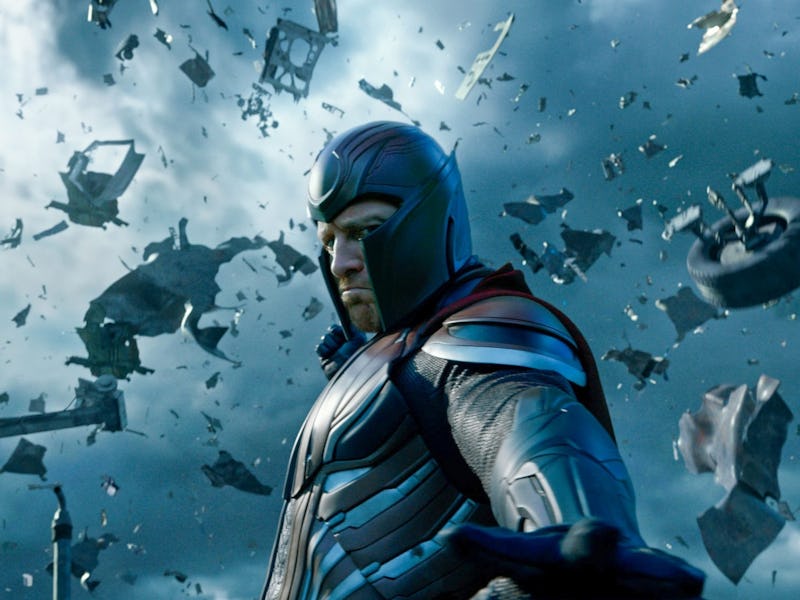The 'X-Men' Movies Have Worn Out Magneto
Ethical ambiguity is all you could want in an antagonist. But Magneto has lost his metal.

Of the many faults that plague Bryan Singer’s X-Men: Apocalypse, the latest in 20th Century Fox’s capture of the Marvel license, the failure of Magneto and his character arc takes the cake. Once the most engaging, sympathetic antagonist in a superhero movie, Magneto has morphed from the franchise’s biggest asset into the biggest bore.
First played by Sir Ian McKellan and now by a brooding Michael Fassbender, Magneto — or Erik, or Erik-you’re-better-than-this!, as Xavier calls him — was introduced in 2000’s X-Men as a child living in the nightmarish Nazi-occupied Poland, and discovers his ability to manipulate steel. His emotional debut set the tone for his character, whose intimate experience with institutionalized racism informed him of the 21st century prejudices against mutants.
This made Magneto the perfect foil: He was the bad guy, but he wasn’t capital-E brand of evil. He was an appropriate shade of gray for Hollywood’s colorful superheroes, with a superpower that enabled cool CGI but left enough emotional room to let audiences understand his feelings of hate, revenge, and his longing for acceptance.
This continued, less prominently and less effectively, into X2 and X-Men III. But after a shitty Wolverine thing, there was the excellent X-Men: First Class, the 2011 soft reboot from Matthew Vaughn. With an emotionally fulfilling look into Erik’s young adult life, his romantic wrinkle with Raven (Jennifer Lawrence), and his embrace of his Magneto identity — not to mention a richly tense return to his origins in Poland — in some spiritual way, First Class was the Magneto prequel that never was.
First Class reinvigorated both the X-Men movies and Magneto himself, but 2014’s Days of Future Past ended that abruptly. With McKellan’s Erik fighting alongside Xavier for the survival of the human and mutant race, Fassbender’s younger Magneto became hostile and antagonistic for the sake of plot. No longer was Magneto an allegory for the film’s ethical ambiguities. Instead, he was a guy with a useful power set whose only conflict was that he still had feelings for Mystique and Xavier. While the personal drama was one of the better things about First Class, it felt ill-fitting for the foreboding Days of Future Past.
And then, there’s X-Men: Apocalypse, which somehow understands Erik but ultimately does nothing with him. A decade after the events of the Paris Accords, Erik is now living a simple life with a new family in Poland, but he’s discovered and his family is killed (accidentally, for some reason). Erik joins Apocalypse as one of his horseman, and it almost makes sense: Prejudice, a dominant theme in these movies, once again brought tragedy to Erik’s life. So why shouldn’t he join Apocalypse to rid this world of its ugly hate?
That’d be a great story, but besides Apocalypse being a droning bore, it stumbles during Magneto’s arc. Quicksilver, the speedster son Erik didn’t know he had, was meant to be the renewed purpose in his life. He still has a family, be it Quicksilver or even Xavier’s School, which Xavier offered him a position to let him stay and teach. Imagine Fassbender as the hot professor, teaching physics in tweed. That’s a happy, well-deserved life for the weary Holocaust survivor. But he refuses because… he’s Magneto?
X-Men: Apocalypse should have been the closing note of the “new” X-Men, with Magneto’s story tracing its single, most interesting arc. From a man who loses a family to having one in the end, that’s a complete journey that would have meant something if these movies bothered. But since Fox wouldn’t let one of its most profitable franchises call it a day, it’s not letting Magneto rest either, even though he looks like he desperately wants to.